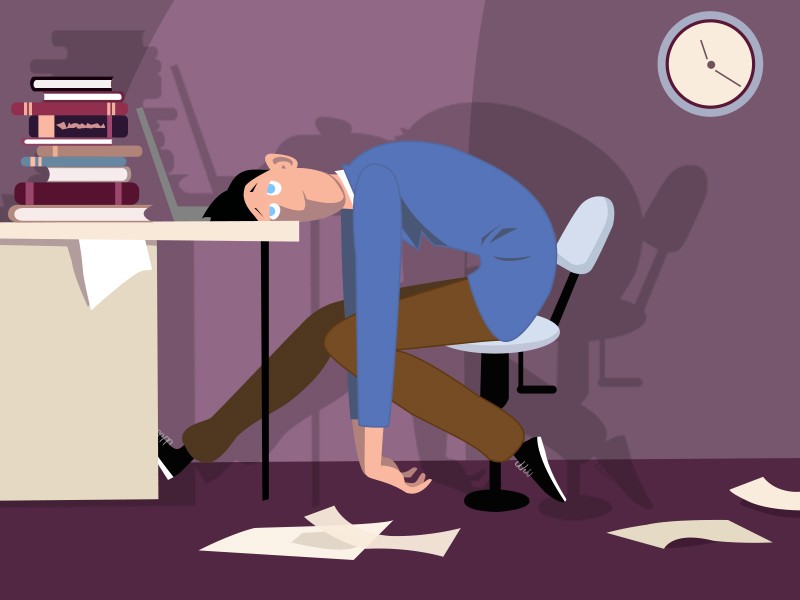Combatting the student burnout

Burnout: the feeling of physical, mental and/or emotional exhaustion as a result of excessive stress and frustration.
 Graphic by Fani Hsieh
Graphic by Fani Hsieh
The first time someone told me to take care of my mental health, I just nodded slowly.
Soon after, I learned the important distinction between mental illness and mental health, the latter being something of which we can all take control of and care for. Mental health is the balancing act of managing all aspects of your life; from the social and economic to the mental and physical components.
When this balance skews out of order, you may experience feelings of being overwhelmed, deficiency in motivation or even the desire to withdraw from all social connections. These can be common symptoms for a whole host of complications, but in the spirit of nearing the end of midterm season, let’s discuss burnout.
Recent evidence has suggested that burnout is diagnostically related to depression, but do note that depression exists within the field of mental illness while burnout is a concern of mental health.
Burnout can be defined as the feeling of physical, mental and/or emotional exhaustion as a result of excessive stress and frustration. Recognizing burnout seems to be something that requires a great deal of introspection, especially for students.
“If students are starting to feel a lack of motivation, the first step is to engage in inward-reflection,” explained Elizabeth Flynn-Dastoor, a PhD candidate at Wilfrid Laurier University.
In particular, understanding what activities or studies engage your interest can be a critical first step to avoiding burnout. When it comes to academics, Flynn-Dastoor believes it is essential to acknowledge feelings of dissatisfaction with your program. This acknowledgement can help prevent monotony and disengagement from tasks — two of the many causes of burnout for university students.
In the long run, disliking your field of study may be a good indication that you may also be dissatisfied with employment in the field. However, it is also important to recognize the particular aspects of the academics that you don’t enjoy and evaluate its significance relative to the program as a whole. Unless you plan to use your degree in ethno-cultural silos to land your dream job as a fishmonger in North Korea, it’s unrealistic to expect that you’ll enjoy all aspects of your job.
Every job has its own specific frustrations and rewards, but we’re all unemployed university students, so we shouldn’t be expected to know that.
An aforementioned symptom of burnout — detachment from social activity — was emphasized by both Flynn-Dastoor and Laurier professor of organizational behaviour Greg Irving as being a serious symptom to avoid when combatting burnout.
They emphasized that building and developing meaningful connections with other people is central to creating a strong support system and sense of fulfillment to help overcome burnout.
Further, Flynn-Dastoor stressed the importance of diversifying social experiences in helping to prevent an impending slump.
This is to emphasize the importance of making meaningful connections with other people and “doing something that brings enjoyment without any other expectations.”
Finding a healthy alternative to mix into your six-day clubbing routine can be beneficial for re-kindling your motivation and ability to manage physical and mental exhaustion.
Flynn-Dastoor narrows the success of mitigating the risk of burnout to “be intentional and thoughtful” about our approach to both academic and non-academic pursuits.
She suggested putting a conscious effort towards “nurturing all aspects of oneself, mind and body” through various activities. Keeping a journal of the activities’ benefits or hindrances to your well-being is crucial.
A short walk in nature for some could be as euphoric as tackling the Wounded Peacock yoga pose, so long as it is “practiced on a regular basis, and sustained as a habit,” as recommended by Flynn-Dastoor.
When experiencing burnout, Irving outlined that “withdrawing from people is likely the biggest mistake you can make.” Our social connections can be pivotal to championing the phenomenon. Effective channels such as open conversation with friends, family and professionals can help reduce the effect of burnout.
There are many online resources to learn more about mental health, one of which is Jack.org, an organization which is striving to de-stigmatize mental health for young people by encouraging students to take control of their mental well-being.
Understanding the distinction between mental illness and mental health is important, and it starts with recognizing that one in five Canadians have mental illness, but five in five people have mental health.


